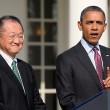As published in CNN
Editor’s Note: Terra Lawson-Remer is a Fellow at The Council on Foreign Relations and Assistant Professor at The New School University. She was formerly Senior Advisor for International Affairs at the U.S. Department of the Treasury.
Obama’s dark horse nominee for World Bank President-medical doctor, PhD anthropologist, Ivy League college professor, hip-hop impresario, and Dartmouth University President Jim Yong Kim (JYK) took many power-broker insiders by surprise.
JYK is not a politically connected international diplomat, as were his predecessors Robert Zoellick and Paul Wolfowitz, nor a globally renowned financier like former World Bank President Sir James Wolfensohn.
Instead, through Partners in Health, the NGO that he co-founded with Paul Farmer, Kim earned his chops forging a new paradigm in community-based health care that cost-effectively targets the root causes of diseases in the world’s poorest countries. JYK will come to the Bank as a lifelong health specialist, educator, and visionary development practitioner.
Human development outcomes like good health and education (called ‘human capital’ by economists) allow people to become productive workers and technological innovators. This drives economic growth and reduces poverty.
As stated succinctly by the World Health Organization’s 2001 Commission on Macroeconomics and Health, “Health is a priority goal in its own right, as well as a central input into economic development and poverty reduction. Increased investments in health would translate into hundreds of billions of dollars per year of increased income in the low-income countries.”
Likewise, countries that invest in the education of their citizens realize higher growth and lower poverty rates, a stylized fact long recognized by economists like Mincer, Becker, Spence, and Krueger. Human capital contributes to growth directly, by increasing labor productivity, but also indirectly, by spurring technological change.
Human development and economic growth reinforce or undermine each other in a virtuous (or vicious) cycle. It is extremely difficult to break a vicious cycle by first increasing economic growth. Examining countries across time, development success stories have almost universally been countries that first improved their levels of human development by improving health outcomes, investing in education, and reducing poverty.
The country of Kim’s birth, South Korea, is one of the most impressive economic development successes of the past fifty years. In 1960 South Korea’s per capita income was just under US$1,800, about the same as Cote D’Ivoire and Sri Lanka. By 2008 its per capita GDP was over US$25,000, earning it entry into the OECD – the elite club for the world’s richest countries. South Korea’s astonishing economic success can be attributed in significant part to government policies that prioritized investments in health and education.
In addition, JYK’s approach to economic development reflects the cutting edge of development practice. Partners in Health prioritizes outcomes like lower HIV/AIDS infection rates, rather than inputs like dollars spent – embracing an evidence-based model to scale-up interventions that have measurable impacts. This approach has gained adherents from the Gates Foundation to MIT to the halls of the U.S. Congress.
Historically the World Bank has assessed staff performance based on the number of loan agreements signed and the amount of money disbursed. In an era of increasingly constrained resources, Kim’s focus on results is more important than ever.
At the same time, Kim’s work places the power to shape development interventions in the hands of the intended beneficiaries themselves, which builds capacity and ensures accountability. His community-based approach entails piloting locally embedded projects, collaborating with civil society, taking account of local conditions, and responding to homegrown knowledge.
Tackling poverty from the bottom-up addresses the accountability deficit that has long haunted the aid community, creating built-in feedback mechanisms to ensure projects are meeting the needs of the poor. The World Bank has already begun to embrace a more community-empowered framework. Under Kim’s leadership this important new direction could develop sustainable roots.
Kim’s long experience as an educator will also serve him well. Countries across the Middle East, North Africa, and Asia are now struggling to capitalize on the potential demographic dividend generated by their large populations of young people. Yet if graduates face unemployment rather than opportunity, this dividend will be squandered, sowing the seeds of discontent and stagnation. Ensuring that young people now entering the workforce have the skills they need to match the jobs emerging in dynamic sectors is a critical challenge that Kim is ready to meet.
Most compellingly, Kim has focused his entire life’s work on meeting the needs of the poorest and most vulnerable. Aggregate economic growth can sometimes raise the yachts while swamping the dinghies.
Fighting poverty also requires ensuring equity. Although there is a strong correlation between higher levels of economic growth and lower incidences of poverty in countries across time, the nature of this relationship depends on patterns of government expenditures, levels of inequality, fairness in the rule of law, and the sectors favored by growth.
Not content to just improve aggregates, JYK has long prioritized those who have been left-out and left-behind. This approach to economic development, which puts socioeconomic inclusion and exclusion center stage, is the linchpin of inclusive economic development. His leadership in promoting equity and inclusion is a breathe of fresh air, and will steer the World Bank in the right direction.
This article appears in full on CFR.org by permission of its original publisher. It was originally available here.

